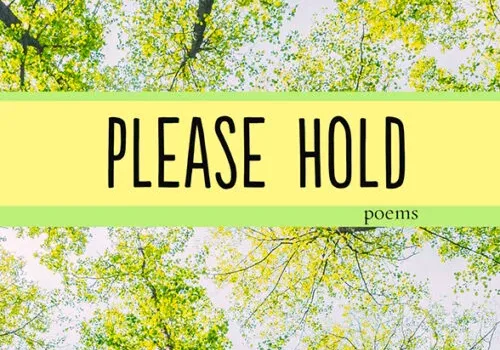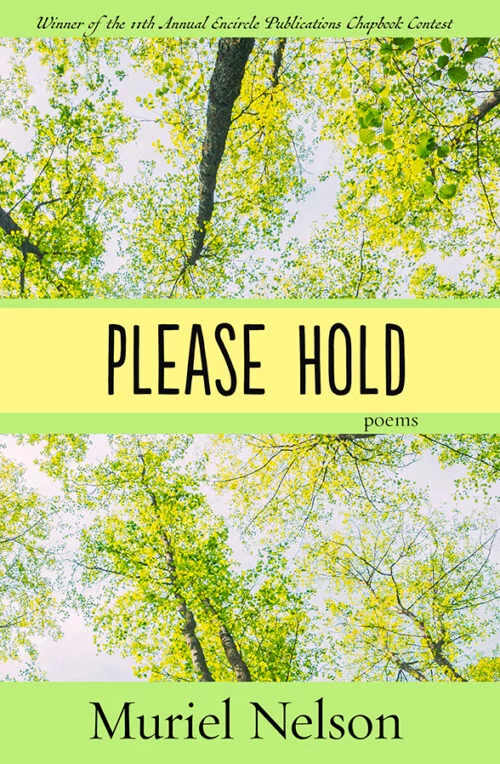Praise be to Encircle Publications for selecting my friend Muriel Nelson’s Please Hold as the winner of their 11th annual chapbook competition. Any and all lovers of poetry currently suffering frustration, blahs, even despair, over lineated topical prosaics may take heart. These twenty-five poems bind together actual poetry: musical-magic words. Deployed from within the courteous, indefatigably sunny suburban disposition I remember from my own childhood, they flick quirts & quips of vocabulary at the thorniest issues in Christianity’s crown: the suffering and death of innocents, ripping as usual through the here and now, while a good-enough god’s vital creation flourishes, for instance, its novel & ingeniously variable virus. Nelson (sometimes assisted by a stone-faced sidekick gargoyle) rubs dry sticks together, flint-striking among them worrisome sparks of prayer over nature, beloveds and the commons, such as they (and we) may seem-or-not to get along these days. Or ever? Organ of vox humana, ”That ultra-low purr,/ is it your scary business? Your pleasure?” (God Deafness).
Nelson’s work, full of noises and mouth feel, craves and rewards reading aloud: “words like worms wriggle out” (A Few Words from a Haystack with Facehole); “gold leaf down brown water, brown spot down gold leaf” (Up to You) as “radios amplify hubbubs” (Nap). “Rather than dazzle, please mail juncos”, a speaker requests. (You There). “Sanctus,” via violin, “rises/ over orange machines and trills through diesel” (Hold Sway). Wanton, irresistible frolicking language made of everyday diction we already know by heart.
Anxieties addressed in addition to pandemic include other illnesses and infirmities, clear air turbulence in aviation (Nelson’s own son the pilot at risk); hair overgrowing unruly in lockdown, nearby Mt. St. Helens’ volcanic eruption and forest fires, plus whatever else may fill in any of our blanks. Why is our local nit picked of the universe such a mess-in-plain-sight? Because this world of oops is God’s mirror-image shattered in a truck mishap. (Nap) Image-recognitions like this, more persuasive and quicker-to-the-pinch than rational proofs, are why/how we get to make sense of things, even as sense may go on to make and unmake the best efforts of artists, fans and rationalists. Because seeing is believing, the gardener –reluctantly conceding that god obviously prefers weeds– can’t really mind. Don’t look there. Look over here instead.
More ‘Notes’ than just one on hummingbird arithmetic would be nice: Vox humana, gargoyle, worm moon, clear air turbulence, retrograde, ankyloglossia, A440. I do like reading notes before I begin a book, getting that initial feel for what’s in store. And, what with everything zapping all around the world’s diverisities all the time, a particular writer’s cultural tropes are not so much common knowledge as used to be.
The sheer antic fun of Nelson’s wordplay, nimble, precise and outlandish enough never to get caught out in bourgeois complacency, wins us over and wins. Goofy poem “Hug,” for instance, declares its own title a word too ugly to be tolerated, and so (um, ‘embrace’?) substitutes (why not?) “waffle,” enumerating the latter’s superior fluff and sugary qualities and ending up (neverminding stiffly-posed ancestor portraits) in the very waffle that created us descendants. Or, “A woman with a hole in her brain the size of a lemon says”/ I find repetition soothing. Really?” The poem’s skeptical speaker attempts a few irritatant repetitions in rebuttal, but soon concedes the issue utterly.
Atheist Zweig engages these glories in awe for quite a while, as the music tickles and soothes. Gradually, though, an inner Richard Wilbur begins to notice the gigantic absence here of any human (and systemic) depravity in the world. If we can’t blame God (busy puttering light and music among the weeds), who gets held to account, and how? One poem, after ee cummings, seems to indict Mister Death, but this, sez I, is mere Manichaean heresy: did superpower Death create Itself? “Second Story Window” acknowledges a “God, who contours love with dark // who forsakes even Christ,” yet ends beguiled hearing bells and a shadow singing. In these poems music and wit (soothing, satisfying) never accuse. “Nap” comes closest: “God of great pain, lone, // self-bombing, bloody-crossed God… whom no one hugs, you untouchable, sharp, broken One.” Christianity, though, is obliged to address deliberate human sin— which the crucified god, (as we’re told by numerous authorities), forgives in advance and for all time. Wow! Thanks a bunch! Let’s sin again, maybe more so this time! Did I miss the parts where the moneybaggers get bounced out of the temple and barred from the heavenly kingdom even as some lumpy beast slicks through the needle’s eye?
Approaching the end, Please Hold arrives at “doting,” three times: a word I resist because doting is foolish. Am I supposed to be foolish for having indulged in delight among these poems? Must I, must other readers and Nelson herself, commit to holy foolery for Jesus and Saint Paul? After some research I reread “A woman with a hole in her brain the size of a lemon says” –increasingly my favorite. We cultured folk know perfectly well that art and all its witness entail willing suspension of disbelief; likely you and I can entertain Holy Foolishness without becoming wholly foolish. My atheistic smarts briefly snooze right over there, safe-&-sound.
Revisit the commodious mischief of this robocroon title, perpetrated, surely, by the gargoyle sidekick: Your prayer is very important to us. Our only-one god is busy hearing other supplicants and will respond to you in the order of your prayer received. You are currently number four trillion and eighty-two, please hold, or pray again later. (music) Organ, please hold that vox humana note. Dike against the sea, please hold; my place in the soup line; wall against the dark hordes, shutters against the storm, please hold. Hug me a little longer, (urgently/politely) don’t let go. Endure, don’t disintegrate, don’t die. And so on, let me count the ways. Please Hold your horses, your fire, your tongue, that thought, this book.
Please Hold, poems by Muriel Nelson, Encircle Publications, 2021, 28 pp.


